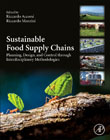
Sustainable Food Supply Chains: Planning, Design, and Control through Interdisciplinary Methodologies
Accorsi, Riccardo
Manzini, Riccardo
Sustainable Food Supply Chains: Planning, Design, and Control through Interdisciplinary Methodologies provides integrated and practicable solutions that aid planners and entrepreneurs in the design and optimization of food production/distribution systems and operations. With synthesized coverage of the existing academic literature, this book integrates the quantitative models and tools that address each step of food supply chain operation, presenting readers with easy access to information that supports quantitative and practicable methods. Broken into four parts, the book includes an introduction, problem statement, quantitative models, tools, case studies, applications, and an integrated framework for food supply chain system and operations design. Contains quantitative models and tools that address the interconnected areas of the food supply chainSynthesizes the academic literature relating to sustainable food supply chainsDeals with interdisciplinary fields of research (Engineering, Food Science, Biology, Land Planning) that rule food supply chain systems and operationsIncludes case studies and applications INDICE: Part A Introduction and Problem Statement 1. Introduction 2. Food supply chains. Problem statement and background 3. Food supply chain ecosystem. A new definition Part B Models and Tools 4. Crop systems. A model survey 5. Land-use problem in agriculture. Models and tools 6. Land-use and climate change. Planning models 7. Food processing systems. Plants and operations 8. Packaging plants and technologies. A survey 9. Shelf-life models 10. Perishable items warehouses. Design and management models 11. Food transportation. Infrastructures and technologies 12. Food distribution delivery networks. Support-decision models 13. Retailer supply chains. (A logistic-driven survey) 14. Food demand forecast. Models and tools 15. Urban food planning. Patterns and planning methods 16. Food-Packaging closed-loop network. Network design models 17. Renewable energy systems in agriculture. (Competitive models) 18. Renewable energy to power supply chain infrastructures. Part C - Case studies and Applications 19: Edible Oil and Wine 20: Meat 21: Bakery Products 22: The Catering Industry 23: Fresh Fruit and Vegetables Part D - Conclusion 24. Food supply chain ecosystem. An integrated framework 25. Conclusions
- ISBN: 978-0-12-813411-5
- Editorial: Academic Press
- Encuadernacion: Rústica
- Páginas: 448
- Fecha Publicación: 01/06/2019
- Nº Volúmenes: 1
- Idioma: Inglés
